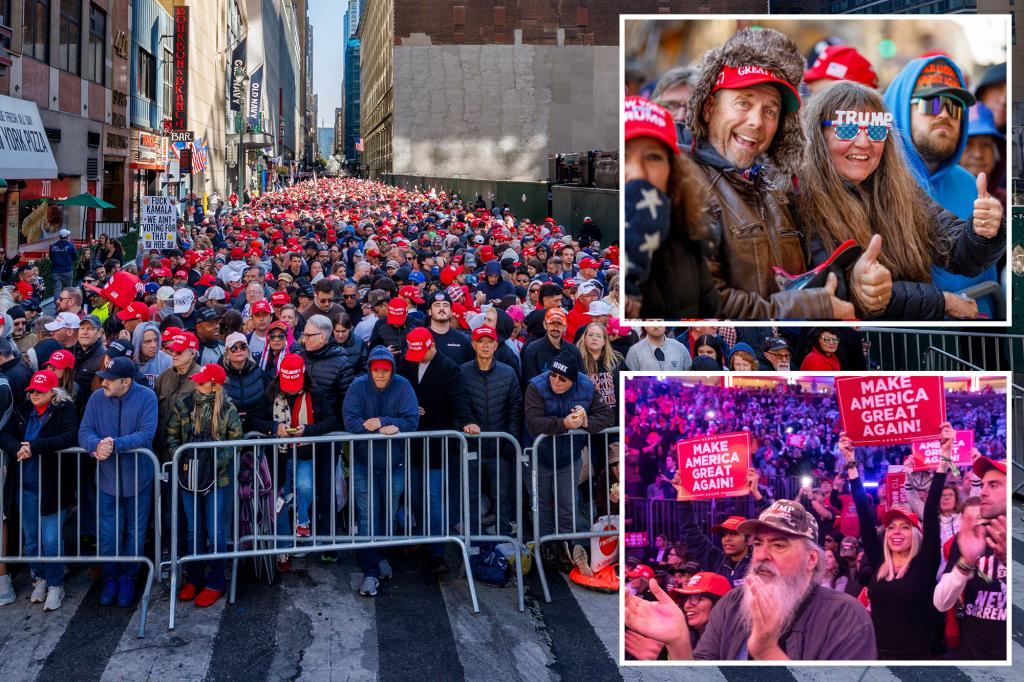pmac666 wrote: The economists, left and right, are quite clear what the better program is.
Much has been made of the fact that economists generally agree that Trump would be worse for the economy than Harris.
But again, when your only selling point is "Trump is worse" that's not a resounding rallying cry.
Factcheck.org has looked at this is some detail. Let's have a look at their summary, available here:
https://www.factcheck.org/2024/09/harris-misleadingly-cites-some-economic-analyses-of-her-policies-and-trumps/factcheck wrote:Harris again cited the Nobel laureates, Goldman Sachs and Moody’s in an interview that aired Sept. 25 on MSNBC, saying they found that “my plan would grow the economy, his would shrink the economy,” and the same day in a speech in Pittsburgh, she referred to “a survey of top economists by the Financial Times and the University of Chicago,” saying it “found that, by an overwhelming 70 to 3% margin, my plan would be better for keeping inflation low.”
Harris was mostly correct in her description of Moody’s Analytics, the Financial Times survey and the 16 Nobel laureates, except the latter commented on President Joe Biden’s economic policies, not Harris’ proposals since she became the Democratic presidential nominee. But she is wrong about the Wharton analysis and exaggerates what Goldman Sachs said.
"Mostly correct". That's what their comments boil down to, and I would agree. She's mostly right in saying that economists agree she would be better for the economy than Trump, or at least not as bad.
About Penn-Wharton:
factcheck wrote:PWBM found that Harris’ plan would reduce the nation’s gross domestic product more than Trump’s, and would reduce workers’ wages more.
PWBM did conclude that Trump’s plan would add about twice as much to the nation’s debt, but PWBM warned that the debt added by both candidates’ plans would fall on “future generations who must finance almost the entirety of the tax decreases” each has proposed.
PWBM determined that under Harris’ tax and spending plan, “Relative to current law, GDP falls by 1.3 percent by 2034 and by 4 percent within 30 years (year 2054). Capital investment and working hours fall, thereby reducing wages by 0.8 percent in 2034 and by 3.3 percent in 2054.”
It also found that Harris’ plans would increase cumulative deficits by $1.2 trillion over the next 10 years on a conventional basis and by $2 trillion on a dynamic basis. (Dynamic forecasts take into account the policies’ expected effects on economic activity.)
More generally, PWBM concluded: “Lower and middle-income households generally benefit from increased transfers and credits on a conventional basis, while higher-income households are worse off.”
A mixed bag there. The poor can take a bit of comfort if Harris wins. The rich and middle class will not be thrilled.
About the Goldman-Sachs analysis:
factcheck wrote:“We estimate that if Trump wins in a sweep or with divided government, the hit to growth from tariffs and tighter immigration policy would outweigh the positive fiscal impulse, resulting in a peak hit to GDP growth of -0.5pp in 2025H2 that abates in 2026,” the report said.
In short, real GDP would continue to grow, but at 0.5 percentage point less than it otherwise would in the second half of 2025.
As for a Harris victory, the analysts at Goldman Sachs said: “If Democrats sweep, new spending and expanded middle-income tax credits would slightly more than offset lower investment due to higher corporate tax rates, resulting in a very slight boost to GDP growth on average over 2025-2026. If Harris wins with divided government, the effects of policy changes would be small and neutral on net.”
In the CNBC interview, Solomon was asked about Harris’ use of his company’s report during the debate. Harris said, “What Goldman Sachs has said is that Donald Trump’s plan would make the economy worse. Mine would strengthen the economy.”
“I think a lot more has been made of this than should be,” Solomon said. “What the report did is it looked at a handful of policy issues that have been put out by both sides, and it tried to model their impact on GDP growth. The reason I say a bigger deal has been made of it is what it showed is the difference between the sets of policies that they put forward was about two-tenths of 1%, OK? So [the] economy grows, OK, if you took these particular sets of policies they looked at.”
Pretty much on the fence, leaning slightly toward Harris.
The Moody's analysis was strongly pro-Harris, but still not without caveats:
factcheck wrote:“Assuming Harris and Trump are able to fully implement the policies they have proposed when they take office, the economy will perform better under Harris than under Trump in their terms,” Zandi told Newsweek in a Sept. 20 article. “That is, real economic growth will be stronger, inflation and interest rates lower and budget deficits and debt lower under Harris’ policies than under Trump’s policies,” he said.
However, a Moody’s Analytics report published in early August said that it’s most likely if Harris wins the election, she will have to deal with a divided Congress – making it difficult to execute her full agenda, which Moody’s assumed would be similar to what was in the Biden-Harris administration’s proposed budget for fiscal year 2025. But that scenario would still work out better for the economy than if Trump becomes president with a Republican-controlled Congress, the second likeliest outcome, the analysis said.
Even with a split Congress, Moody’s economists projected that Harris’ proposals would lead to average annual economic growth of 2.1% from 2024 to 2028. The economy would still grow under Trump and a Republican-controlled Congress – contrary to Harris’ suggestion in the MSNBC interview that the economy would “shrink” – but the increase would occur at a slower average rate of 1.3% annually.
Moody’s also said that “under the Republican sweep scenario,” consumer price inflation increases from 3% in 2024 to 3.5% in 2025, “fueled by the higher tariffs, outflow of foreign immigrants, the resulting tighter labor market and more quickly rising labor costs, and tax-cut-fueled fiscal stimulus.” Real incomes and consumer and business sentiment would be weighed down by the higher inflation and interest rates, starting a recession by the middle of 2025, the analysis said, as Harris indicated in her remarks about Trump’s plans.
The Financial Times survey of economists, gives strong support to Harris, on two very specific questions, deficits and inflation:
factcheck wrote:In Pittsburgh, Harris correctly cited a survey by the Financial Times and the University of Chicago Booth School of Business. “A survey of top economists by the Financial Times and the University of Chicago found that, by an overwhelming 70 to 3% margin, my plan would be better for keeping inflation low,” she said.
The survey, which the Financial Times wrote about on Sept. 14, asked 37 economists: “If the Harris or Trump economic platforms were to be enacted, which do you think would be more inflationary in the medium term?” In response, 70% said Trump’s plans would be more inflationary; 27% said that there would be “no material difference in their inflationary consequences,” and 3% said Harris’ plans would be more inflationary.
There was a similar response to the question about federal deficits: 70% said Trump’s plans would lead to larger deficits; 19% said there would be “no material difference,” and 11% said Harris’ plans would “produce larger federal budget deficits in the medium term.”
The "Nobel Laureates" letter is also addressed by Factcheck, but that article is a month old and there's a new version of the letter, signed by more Laureates, so I'll skip Factcheck's analysis and go to that.
https://finance.yahoo.com/news/23-nobel-prize-winners-push-174809952.htmlThe signatories—who make up more than half of the prestigious prize’s living recipients in the U.S.—said they support Harris’s candidacy because she “would be a far better steward of our economy than Donald Trump.”
“While each of us has different views on the particulars of various economic policies, we believe that, overall, Harris’s economic agenda will improve our nation’s health, investment, sustainability, resilience, employment opportunities, and fairness and be vastly superior to the counterproductive economic agenda of Donald Trump,” they wrote, in the letter obtained first by CNN.
Of course, neither candidate has fully laid out an economic program yet. Still, the economists insisted they have a “clear picture” of what could be to come thanks to the two politicians’ previous actions, policies, and practices.
“Simply put, Harris’s policies will result in a stronger economic performance, with economic growth that is more robust, more sustainable, and more equitable,” they concluded.
Trump’s weaknesses and Harris’ strengths
Signatories take issue with Trump’s proposal of high tariffs and “regressive tax cuts for corporations and individuals,” explaining that these moves will result in “higher prices, larger deficits, and greater inequality.”
Trump once deemed himself “a Tariff Man” on Twitter—a name that could backfire. His proposed tariffs could increase costs for American households by $2,500 to $3,000 every year, Adam Hersh, a senior economist at nonpartisan advocacy group EPI Action, told NBC.
Then there’s chaos—or even the threat of chaos, which also impacts the larger economy. And Trump’s administration could represent such havoc. “Among the most important determinants of economic success are the rule of law and economic and political certainty, and Trump threatens all of these,” the world-leading economists cautioned in the petition.
That one's unequivocally pro-Harris, and being signed by 23 Nobel-winning economists is pretty impressive. Still, it illustrates what I said. The main element there is not that Harris is selling something magnificent, but that what Trump is selling is just so damned awful.
My personal feeling is that Trump is even worse than they assume. They are academics, after all, and tend to be reserved. I think the triple-whammy of higher deficits, mass deportations, and extreme tariffs, could be enough to knock down the American economy and lead to a long depression of 1930's magnitude.
If he wins, and
if he is actually able to carry out all his threats.
So it's not that I disagree that Kamala is the better choice, and by a long shot. My point was just that she's done a piss-poor job of selling it.
pmac666 wrote:Well, doesnt she with her wanting to tax the rich?
Does she? Maybe, maybe not. She's hinted at higher taxes for the rich, but been pretty cagey about not getting pinned down on it.
The right has been trying to paint her as an extreme leftist. She obviously isn't, but she's so scared of the term that she's been ultra careful about soft-selling anything that might hint at extreme leftism.
Here's where you would have been better off with someone like Bernie Sanders. Someone who basically says, "yeah, I'm a socialist. The rich have been giving you the gears for forty years, it's time to take some ground back." Someone like Sanders who's not afraid to get in-your-face might be rejected by the electorate, or he might not. I would have at least given it a chance. There's plenty of evidence that the last 40 years have been a disaster for the working class in America. The rich have gotten richer and the poor have gotten poorer faster than at any time in the past. When a radical politician has the courage of his convictions and comes out swinging, he'll often surprise you.
Kamala's timid equivocating, trying to move the needle a little to the left but not too much, has only left people mostly uninspired.
There's still a chance that she'll make it, but I think she's now the underdog. A month ago she looked like she was winning.









































































































